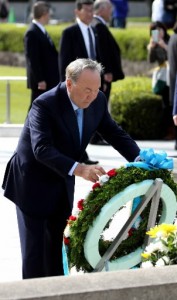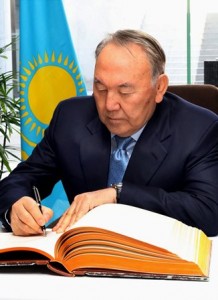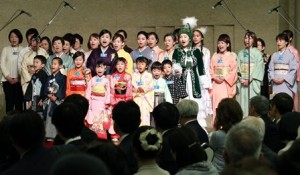President of Kazakhstan visits Hiroshima Peace Memorial Park for first time
Nov. 10, 2016
by Kyosuke Mizukawa, Staff Writer
On November 9, Nurusultan Nazarbayev, 76, the president of the Republic of Kazakhstan, where nuclear tests were repeatedly carried out during the Soviet era, visited the Peace Memorial Park in Naka Ward, Hiroshima for the first time and toured the Peace Memorial Museum. In a speech, Mr. Nazarbayev talked about the damages done to his country by nuclear testing, and said that the people of Hiroshima and Kazakhstan have shared the suffering of exposure to radiation. He called for cooperation to abolish nuclear weapons.
Guided by Hiroshima Mayor Kazumi Matsui, Mr. Nazarbayev laid flowers at the Cenotaph for the A-bomb Victims then moved to the museum. While listening to explanations offered by Yasuyoshi Komizo, the chairperson of the Hiroshima Peace Culture Foundation, Mr. Nazarbayev studied the exhibits, including a lunchbox that was charred by the A-bomb blast.
He made his speech before about 500 people at the International Conference Center Hiroshima and said that he was deeply struck by seeing the A-bomb damage first-hand. He went on to describe the damage done to his country by the more than 450 nuclear tests that were conducted there, saying, “The international community has a responsibility to work together and take action so that the terror of nuclear weapons will never again be witnessed. Let us join hands and minds to realize this goal.”
Mr. Matsui then bestowed the title “Honorary Citizen of Hiroshima” upon Mr. Nazarbayev. In the museum’s guest book, he wrote, “If we cooperate with one other, we can build peace in the world and the people of all nations can enjoy prosperity.” During the luncheon that followed, he reportedly said that we he would encourage Russian President Vladimir Putin to visit the A-bombed cities during his upcoming visit to Japan in December.
Mr. Nazarbayev has served as president since Kazakhstan gained independence from the Soviet Union in 1991. He shut down the nuclear test site in Semipalatinsk that same year. He was also involved in realizing the Treaty on a Nuclear Weapon Free Zone in Central Asia, which entered into force in 2009.
Citizens’ group lending support to radiation victims in Kazakhstan shares wish for nuclear abolition
by Kyosuke Mizukawa and Akira Sakamoto, Staff Writers
On November 9, members of the citizens’ group in Hiroshima called the Hiroshima Semipalatinsk Project (also known as “Hirosemi”) welcomed President Nazarbayev’s visit to Hiroshima, and pledged to pursue further opportunities for mutual exchange for the greater goal of eliminating nuclear weapons.
“My hometown was torn apart by so many explosions and flashes.” These words from the song “ZAMAN-AI: The Times!” were sung in chorus, in Japanese and Kazakh, by about 40 people at the welcoming event for the president, which took place at the International Conference Center Hiroshima. The song was a symbol of the campaign against nuclear testing in Semipalatinsk. Chieko Kobatake, 64, the deputy director of the group, said with conviction, “We want to spread our hope of nuclear abolition to the rest of the world.”
The group was established in 1998 by citizens who had lent support to athletes from Kazakhstan who were participating in the Asian Games held in Hiroshima in 1994. The group has donated medical equipment and medicines to Kazakhstan, and dispatched doctors to conduct examinations. It has also organized study opportunities for Kazakh students in Japan.
Kashkey Tegi Aiman, 37, a staff member of the Kazakh Embassy in Japan, who was among those singing, said, “I’m happy we could share our wish with the people of Hiroshima. I hope that the friendship between us can continue to grow.” Takashi Hiraoka, 88, the former mayor of Hiroshima and honorary president of the group, attended the event and listened to President Nazarbayev’s speech. “We would like to put more effort into promoting exchange among young people so the memories of nuclear damage can be passed down to the generations to come,” Mr. Hiraoka said.
(Originally published on November 10, 2016)
On November 9, Nurusultan Nazarbayev, 76, the president of the Republic of Kazakhstan, where nuclear tests were repeatedly carried out during the Soviet era, visited the Peace Memorial Park in Naka Ward, Hiroshima for the first time and toured the Peace Memorial Museum. In a speech, Mr. Nazarbayev talked about the damages done to his country by nuclear testing, and said that the people of Hiroshima and Kazakhstan have shared the suffering of exposure to radiation. He called for cooperation to abolish nuclear weapons.
Guided by Hiroshima Mayor Kazumi Matsui, Mr. Nazarbayev laid flowers at the Cenotaph for the A-bomb Victims then moved to the museum. While listening to explanations offered by Yasuyoshi Komizo, the chairperson of the Hiroshima Peace Culture Foundation, Mr. Nazarbayev studied the exhibits, including a lunchbox that was charred by the A-bomb blast.
He made his speech before about 500 people at the International Conference Center Hiroshima and said that he was deeply struck by seeing the A-bomb damage first-hand. He went on to describe the damage done to his country by the more than 450 nuclear tests that were conducted there, saying, “The international community has a responsibility to work together and take action so that the terror of nuclear weapons will never again be witnessed. Let us join hands and minds to realize this goal.”
Mr. Matsui then bestowed the title “Honorary Citizen of Hiroshima” upon Mr. Nazarbayev. In the museum’s guest book, he wrote, “If we cooperate with one other, we can build peace in the world and the people of all nations can enjoy prosperity.” During the luncheon that followed, he reportedly said that we he would encourage Russian President Vladimir Putin to visit the A-bombed cities during his upcoming visit to Japan in December.
Mr. Nazarbayev has served as president since Kazakhstan gained independence from the Soviet Union in 1991. He shut down the nuclear test site in Semipalatinsk that same year. He was also involved in realizing the Treaty on a Nuclear Weapon Free Zone in Central Asia, which entered into force in 2009.
Citizens’ group lending support to radiation victims in Kazakhstan shares wish for nuclear abolition
by Kyosuke Mizukawa and Akira Sakamoto, Staff Writers
On November 9, members of the citizens’ group in Hiroshima called the Hiroshima Semipalatinsk Project (also known as “Hirosemi”) welcomed President Nazarbayev’s visit to Hiroshima, and pledged to pursue further opportunities for mutual exchange for the greater goal of eliminating nuclear weapons.
“My hometown was torn apart by so many explosions and flashes.” These words from the song “ZAMAN-AI: The Times!” were sung in chorus, in Japanese and Kazakh, by about 40 people at the welcoming event for the president, which took place at the International Conference Center Hiroshima. The song was a symbol of the campaign against nuclear testing in Semipalatinsk. Chieko Kobatake, 64, the deputy director of the group, said with conviction, “We want to spread our hope of nuclear abolition to the rest of the world.”
The group was established in 1998 by citizens who had lent support to athletes from Kazakhstan who were participating in the Asian Games held in Hiroshima in 1994. The group has donated medical equipment and medicines to Kazakhstan, and dispatched doctors to conduct examinations. It has also organized study opportunities for Kazakh students in Japan.
Kashkey Tegi Aiman, 37, a staff member of the Kazakh Embassy in Japan, who was among those singing, said, “I’m happy we could share our wish with the people of Hiroshima. I hope that the friendship between us can continue to grow.” Takashi Hiraoka, 88, the former mayor of Hiroshima and honorary president of the group, attended the event and listened to President Nazarbayev’s speech. “We would like to put more effort into promoting exchange among young people so the memories of nuclear damage can be passed down to the generations to come,” Mr. Hiraoka said.
(Originally published on November 10, 2016)










